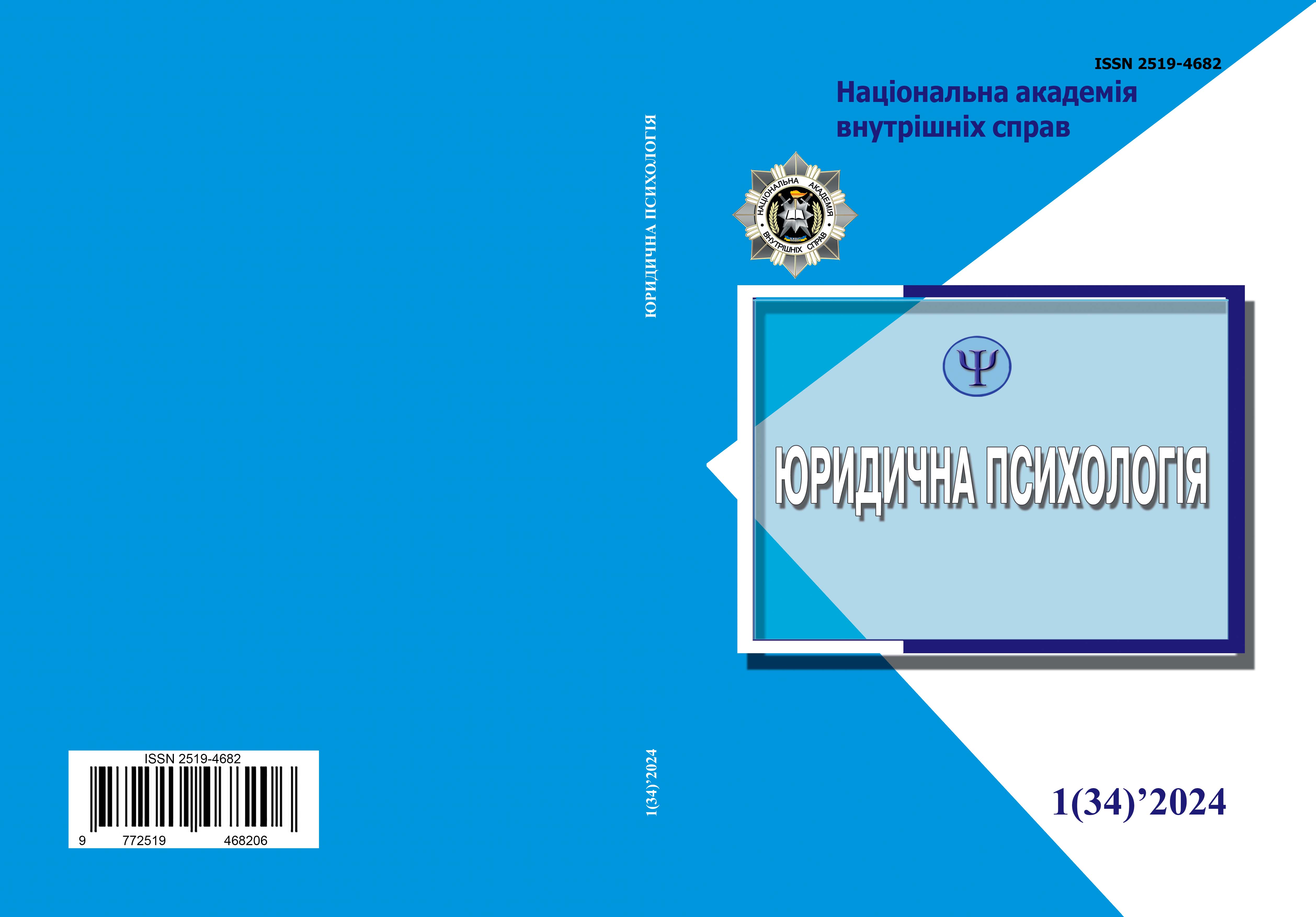Social and Psychological Aspects of Illegal Behavior of a Serviceman
Abstract
Abstract. The relevance of the research topic is due to several reasons that are of practical importance. First, the illegal behavior of a military official has the potential to significantly affect the functioning of military structures, which poses a direct threat to the defense and security functions of the state. Therefore, the study of the socio-psychological aspects of this behavior is of great practical importance for ensuring the discipline and efficiency of the military organization. Secondly, the widespread use of new technologies, changes in the social environment and other factors influence the emergence of new forms of illegal behavior among the military. Therefore, constant updating of knowledge about the socio-psychological aspects of this problem will help to develop more effective strategies for the prevention of criminal offenses in the military sphere of legal relations. The main purpose of this study is to analyze and reveal the socio-psychological aspects that influence the emergence and development of illegal behavior among military officials. This includes the study of factors affecting the formation of moral and ethical values in the military environment, as well as the identification of psychological mechanisms underlying the illegal actions of military officials. With this data, effective prevention strategies can be developed at the state level and psychological training of military personnel can be improved to ensure a high level of discipline, legality and compliance with legal norms in the military environment. The methodological basis of the research is the approach, which includes qualitative and quantitative research, which allows to collect and analyze data on socio-psychological factors and their influence on illegal behavior. Sociological and psychological analyses, which allow to investigate social and psychological mechanisms affecting the behavior of military personnel. Analysis of legal norms regulating military activity and discipline, as well as analysis of empirical observational data, which allow to understand the motivation of illegal activities of military officials. In addition to the above, the scientific novelty and practical significance of this article lies not only in the scientific aspect, but also in the understanding of the motives of a military official exceeding his official powers. Disclosure of these motives will help authorized officials to correctly assess the illegal actions of a military official, which, in turn, will contribute to the effective performance of the tasks of criminal proceedings.
Keywords: deviance; disorganization; criminal offense; motives; investigation; classification.
Downloads
References
Berkowitz, L. (1993). Aggression: its causes, consequences, and control. New York: McGraw-Hill. Retrieved from https://searchworks.stanford.edu.
Bryan, M. (2003). The World as Will. The Philosophy of Schopenhauer (pp. 137-163). Oxford: Oxford Academic. doi: 10.1093/0198237227.003.0007.
Diurkhaim, E. (1998). Suicide: Sociological study (L. Kononovych, Trans). Kyiv: Osnovy.
Fedorchenko, Yu. (2022). Kant I. Preface to the first edition. Philosophy of education, 28(1), 212-221. doi: 10.31874/2309-1606-2022-28-1-14.
Filonenko, V., & Nechytailo, I. (2022). Recidivist criminals: psychological characteristics. Ivano-Frankivsk: Foliant.
Hegel, G. (2000). Fundamentals of the philosophy of law, or Natural law and political science. (R. Osadchuk, M. Kushnir, Trans). Kyiv: Yunivers.
Heidegger, M. (1962). Being and time. (J. Macquarrie, E. Robinson, Trans). Oxford: Basil Blackwell publisher. Retrieved from https://altair.pw/pub.
Holovkin, B., & Navaliana, Ya. (2012). Psychological features of criminals. Form of law, 4. 223-230. Retrieved from https://dspace.nlu.edu.ua.
Kant I. (1781). Kritik der reinen Vernunft. Project Gutenberg-De. URL: https://www.projekt-gutenberg.org;
Komarynska, Yu. (2022). Motives for committing criminal offenses related to domestic violence. Legal psychology, 1(30), 94-102. doi: 10.33270/03223001.94.
Merton, R. (1938). Social Structure and Anomie. American Sociological Review, 3(5), 672-682. doi: 10.2307/2084686.
Nietzsche, F. (2006). The Antichrist. (H. Mencken, Trans). New York: Alfred A. Knopf. Retrieved from https://www.gutenberg.org.
Savchenko, A. (2000). Classification of crime motives. Scientific Bulletin of the National Academy of Internal Affairs of Ukraine, 4. 126-131.
Savchenko, A. (2002). Motive and motivation of crime. Kyiv: Atika.
Shalhunova, S. (2012). The personality of a violent criminal (2nd ed., rev.). Dnipropetrovsk: Lira LTD.
Shepitko, V. (2021). Criminal psychology: history of development and current state. Legal psychology, 1(28), 14-20. doi: 10.33270/03212801.14.
Taldykin, O. (2022). Sociology of law. Structural and logical schemes and tables. Dnipro: Dniprop. derzh. un-t vnutr. sprav.
Velychenko, L. (2022). Psychology of the personality of the criminal as a subject of illegal arms and ammunition trafficking. Legal psychology, 1(30), 74-84. doi: 10.33270/03223102.74.
Zelinskyi, A. (1999). Criminal psychology. Kyiv: Yurinkom Inter.
Zimbardo, P. (2007). The Lucifer effect: Understanding How Good People Turn Evil. New York: Random house. Retrieved from https://ia802808.us.archive.org.
Abstract views: 35 PDF Downloads: 83
- Authors reserve the right to authorship of their own work and transfer to the magazine the right of the first publication of this work under the terms of the Creative Commons Attribution License, which allows other persons to freely distribute published work with mandatory reference to authors of the original work and the first publication of an article in this magazine.
- Authors have the right to enter into separate additional agreements on non-exclusive dissemination of the work in the form in which it was published in the journal (for example, to post an article in the institution's repository or to publish as part of a monograph), provided that the link to the first publication of the work in this journal is maintained.
- The journal's policy allows and encourages the posting of articles by authors on the Internet (for example, in electronic storehouses of institutions or on personal websites), both before the submission of this manuscript to the editorial office and during its editorial processing, as this contributes to the creation of a productive scientific discussion and positively affects the efficiency and dynamics of citing the published work.




